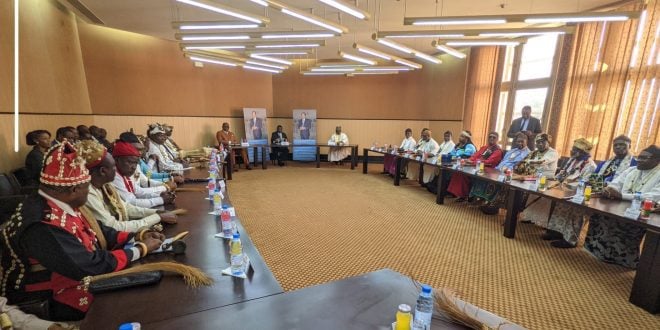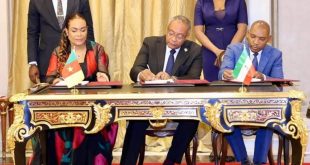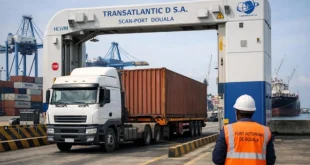CameroonOnline.ORG | On Wednesday, August 6, 2025, a delegation of thirty Sawa traditional chiefs from the South, Littoral, and South-West regions of Cameroon was received at the Unity Palace. The meeting, requested by the chiefs themselves, aimed to reaffirm their support for the candidate of the Cameroon People’s Democratic Movement (RDPC), whom they described as the “best guarantor of peace and development.”
The audience took place in the presence of Ferdinand Ngoh Ngoh, Minister of State, Secretary-General of the Presidency of the Republic, and Chairman of the Strategic Committee tasked with preparing the campaign strategy for the incumbent president, Paul Biya. A role that places him at the heart of the presidential political apparatus.
But what does this act of support really signify? Is it the result of a thoughtful and representative commitment from the grassroots, or is it yet another symbolic gesture — a well-rehearsed ritual — marking the approach of another electoral season?
Traditional chiefs, highly respected figures in their communities, have long occupied an ambiguous space in Cameroon’s political landscape. Officially apolitical, they are nonetheless frequently courted — and at times co-opted — during election periods. This latest show of allegiance to the RDPC appears to follow a familiar pattern in which customary elites publicly align themselves with those in power.
Behind these declarations of support lies the deeper question of genuine representation. Do these chiefs speak on behalf of their communities, or are they expressing personal — perhaps strategic — allegiance to a centralized and enduring political establishment? In a context where calls for democratic renewal and institutional reform are growing louder, such displays of loyalty may be seen by some as conservative posturing, disconnected from the aspirations of youth and emerging civic movements.
The timing and circumstances of this meeting also raise questions. Less than a year before elections, and amid ongoing concerns about electoral transparency, such endorsements often seem less like genuine political commitments and more like signals of continued allegiance to the ruling elite.
Ultimately, while the Sawa chiefs’ support for the RDPC is presented as a voluntary and symbolic gesture in favor of national stability, its actual impact — both politically and socially — warrants closer scrutiny. In a democracy seeking credibility, political engagement must become more inclusive, less performative, and more meaningfully rooted in the real needs and voices of the people.
 CameroonOnline.org Cameroon news, Actualité Camerounaise, live Web TV & Radio, World News and a lot more
CameroonOnline.org Cameroon news, Actualité Camerounaise, live Web TV & Radio, World News and a lot more





One comment
Pingback: Cameroon’s City Mayors Publicly Back Paul Biya Ahead of October Presidential Election – Kamer